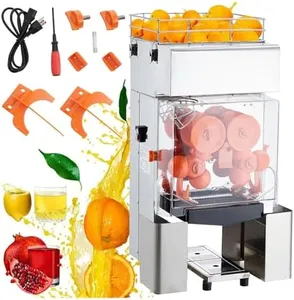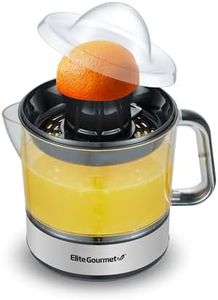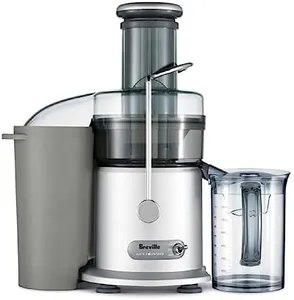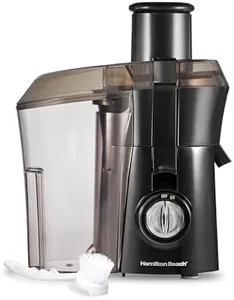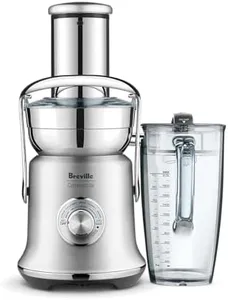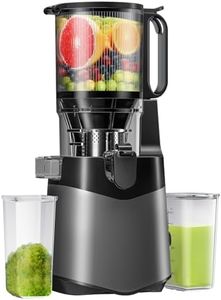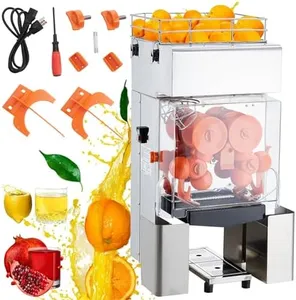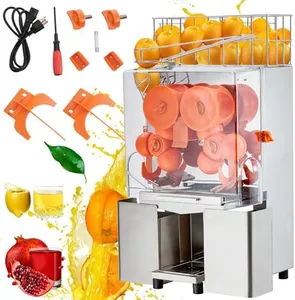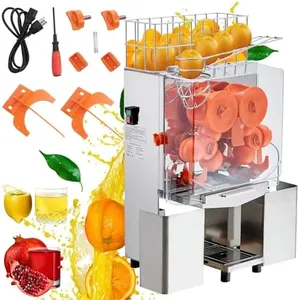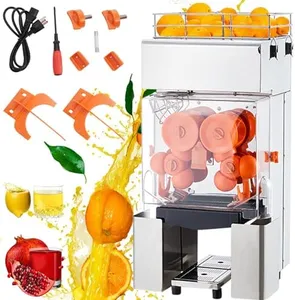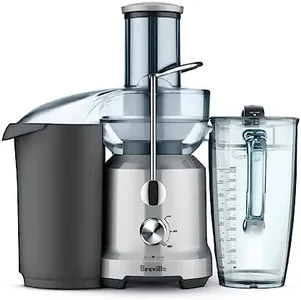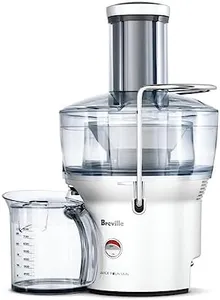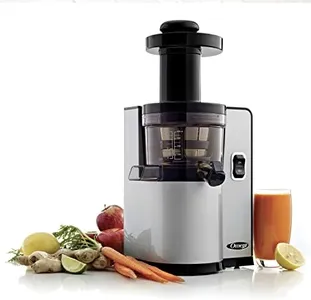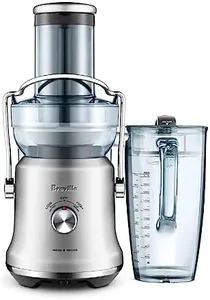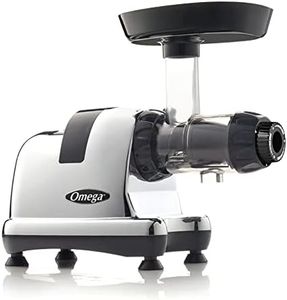10 Best Affordable Juicers 2025 in the United States
Our technology thoroughly searches through the online shopping world, reviewing hundreds of sites. We then process and analyze this information, updating in real-time to bring you the latest top-rated products. This way, you always get the best and most current options available.

Our Top Picks
Winner
Elite Gourmet ETS623 BPA-Free Electric Citrus Juicer, Compact, Large Volume, Pulp Control, Oranges, Lemons, Limes, Grapefruits with Easy Pour Spout, 24oz, Black/Stainless Steel
The Elite Gourmet ETS623 BPA-Free Electric Citrus Juicer is designed for those who love fresh citrus juice without any additives. It’s compact and lightweight, making it perfect for small kitchens, dorms, or campers. The 24-ounce capacity allows for 2-3 servings of juice, and it features a handy pouring spout and handle.
The juicer is simple to use with an auto-reversing electric reamer that starts juicing when you press down and stops when you release, making the process quick and effortless. All parts are dishwasher safe, which makes cleaning easy. Additionally, this juicer is compliant with ETL and FDA standards and is BPA-free, ensuring that your juice is safe to consume.
Its motor is quiet, which is great for early morning juice making without waking the household. However, the maximum power is 40 Watts, which may not be as powerful as some other models, possibly affecting the juice yield. The product dimensions are reasonably compact, ensuring it doesn’t take up too much counter space. This juicer is best suited for individuals or small families who drink citrus juice regularly and appreciate a simple, easy-to-clean appliance.
Customer Highlights
A summary of real customer reviews to highlight what shoppers are saying!Breville Juice Fountain Plus JE98XL, Silver
The Breville Juice Fountain Plus JE98XL is a centrifugal juicer designed for those new to juicing, offering convenience and quick operation. One of its standout features is the 3-inch extra-wide fruit chute, which minimizes prep time by allowing whole fruits and vegetables to be juiced without pre-cutting. This makes it an efficient option for busy mornings. Additionally, it has a dual-speed control to handle both soft and hard produce, ensuring versatility in your juicing options.
The juice yield is optimized by its titanium reinforced disc and Italian-made micro mesh filter basket. Users will appreciate the built-in froth separator that delivers smoother juice. On the downside, centrifugal juicers like this one tend to be noisier compared to masticating juicers, which might be a consideration for noise-sensitive households. While the large-capacity pulp collector and detachable parts make storage easier, the juicer's size might be cumbersome for smaller kitchens.
Ease of cleaning is a plus, as most components are dishwasher-safe, and a cleaning brush is included. Durability is backed by a 1-year limited warranty, though some users might prefer a more extended warranty period for peace of mind. With a powerful 850-watt motor and safety features such as an overload protection LED and safety locking arm, the juicer provides a robust and secure operation. The Breville JE98XL offers a solid balance of performance, convenience, and value, making it a suitable choice for budget-conscious consumers looking to incorporate fresh juice into their daily routine.
Customer Highlights
A summary of real customer reviews to highlight what shoppers are saying!Hamilton Beach Juicer Machine, Big Mouth Large 3” Feed Chute for Whole Fruits and Vegetables, Easy to Clean, Centrifugal Extractor, BPA Free, 800W Motor, Black
The Hamilton Beach Juicer Machine stands out in the affordable juicer category, particularly praised for its large 3-inch feed chute, which allows you to juice whole fruits and vegetables without pre-cutting. This feature saves time and effort, making it an appealing option for busy individuals looking to incorporate fresh juice into their diets. With an 800-watt motor, this juicer is designed to maximize juice yield, handling both soft and hard produce effectively, from apples to leafy greens. Users appreciate the quick juicing process that results in smooth juice without pulp or seeds, thanks to its stainless steel micromesh strainer.
When it comes to cleaning, the Hamilton Beach juicer makes the task manageable, offering dishwasher-safe parts and a cleaning brush to help maintain it. The convenience of easy cleaning is a significant advantage, especially for those who might shy away from juicing due to the hassle of cleanup.
On the downside, some users have pointed out that the noise level can be a bit high, which could be a concern if you’re looking for a quieter juicing experience, especially in a shared living space. Additionally, while the juicer is built to be durable, some reviews indicate that it may not withstand heavy daily use over the long term, though it does come with a 3-year limited warranty to back up its reliability. This juicer is best suited for health-conscious individuals or families looking for an efficient and affordable way to make fresh juice at home without the need for extensive preparation or complicated cleanup. If you're in the market for a straightforward, budget-friendly juicer, the Hamilton Beach Juicer Machine certainly deserves consideration.
Customer Highlights
A summary of real customer reviews to highlight what shoppers are saying!Buying Guide for the Best Affordable Juicers
Choosing the right juicer can make a big difference in your daily routine and overall health. When selecting an affordable juicer, it's important to consider several key specifications to ensure you get the best value for your money. Understanding these specs will help you find a juicer that fits your needs, whether you're looking for convenience, efficiency, or the ability to juice a variety of fruits and vegetables.FAQ
Most Popular Categories Right Now
